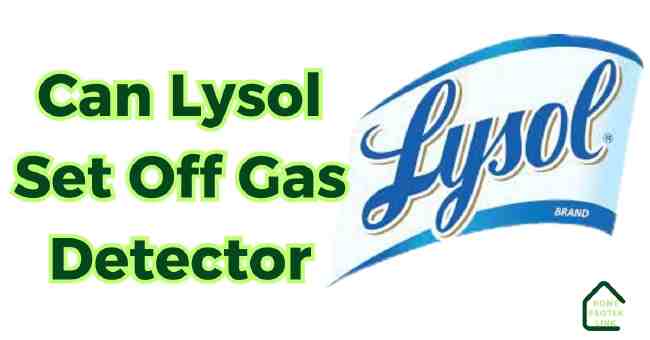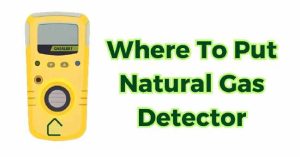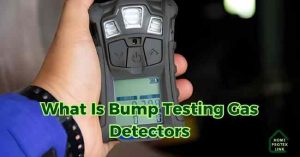Table of Contents
Can Lysol set off gas detector? Yes, it can. Imagine coming home from a long day at work, only to find your gas detector blaring as soon as you walk in the door.
Puzzled, you start searching for the source of the leak, fearing the worst. After a thorough investigation, you realize the culprit was none other than the Lysol spray you used to disinfect your kitchen counters just moments before.
This scenario, while alarming, is not uncommon. Everyday household products like Lysol can sometimes interact with the sensitive sensors in gas detectors, causing false alarms and unnecessary panic.
In this guide, we’ll dive deeper into the surprising connection between Lysol and gas detectors, exploring the science behind these devices and offering practical tips for preventing false alarms in your home.
Let’s dive in.
Overview
Lysol is a popular disinfectant spray used in many homes and businesses to kill germs and freshen the air. However, its chemicals can sometimes interact with sensitive sensors in gas detectors, causing them to alarm even when there’s no real danger.
This can be especially concerning for those living in RVs or homes with propane or LP gas appliances.
Understanding how Lysol and other household products can impact your gas detector is crucial for maintaining a safe living environment and avoiding unnecessary panic.
The Science Behind Gas Detectors
Gas detectors are designed to alert you to the presence of potentially dangerous gases like carbon monoxide, propane, or LP gas. They work by using specialized sensors that can detect even small amounts of these gases in the air.
There are several types of gas detector sensors, each with its strengths and weaknesses:
| Sensor Type | Detection Method | Gases Detected |
|---|---|---|
| Electrochemical | Chemical reaction | Carbon monoxide, hydrogen sulfide, nitrogen dioxide |
| Catalytic bead | Combustion | Flammable gases (propane, methane, hydrogen) |
| Infrared | Absorption of infrared light | Carbon dioxide, methane, other hydrocarbons |
Most gas detectors use a combination of these sensors to provide comprehensive protection against a wide range of gases.
However, their high sensitivity can sometimes work against them, causing them to react to airborne particles from seemingly harmless sources like cleaning products or perfume.
Lysol’s Ingredients and Their Impact on Gas Detectors
Lysol and other disinfectant sprays contain a variety of chemicals that can potentially interfere with gas detectors.
The main culprits are volatile organic compounds (VOCs), which are chemicals that easily evaporate at room temperature.
Some common VOCs found in Lysol include:
- Ethanol
- Isopropyl alcohol
- Propylene glycol
- Nitrogen
When these chemicals are sprayed into the air, they can create a fine mist of airborne particles that can drift into the sensors of nearby gas detectors.
If enough of these particles accumulate, they can cause the detector to alarm, even though there’s no actual gas leak.
Other household products that contain similar VOCs and can potentially set off gas detectors include:
- Hair spray
- Perfume
- Aerosol air fresheners
- Some cleaning products
Real-Life Examples of Lysol Setting Off Gas Detectors
Many people have experienced the frustration of a Lysol-triggered false alarm firsthand. Here are a few real-life examples from homeowners and RV users:
“I was cleaning my kitchen with Lysol when suddenly my carbon monoxide detector started going off. I panicked and called the fire department, but it turned out to be a false alarm caused by the spray.” – Sarah, homeowner
“We were camping in our RV and I used some Lysol to freshen up the bathroom. A few minutes later, our propane detector started beeping like crazy. We evacuated the RV and aired it out before realizing it was just the Lysol.” – Mark, RV owner
These experiences are more common than you might think. Many gas detector manufacturers and safety professionals are well aware of the potential for cleaning products like Lysol to cause false alarms.
Minimizing the Risk of False Alarms Caused by Lysol
While it’s impossible to eliminate the risk of false alarms, there are several steps you can take to minimize the chances of Lysol setting off your gas detector:
- Use Lysol and other aerosol products sparingly and only when necessary.
- Ensure proper ventilation when using Lysol, opening windows and doors to allow fumes to dissipate.
- Avoid spraying Lysol directly near your gas detectors.
- Regularly maintain and test your gas detectors to ensure they’re working properly.
- Consider relocating your gas detectors away from areas where Lysol and other cleaning products are frequently used.
By following these simple guidelines, you can help reduce the likelihood of Lysol causing a false alarm and disrupting your daily life.
Troubleshooting and Responding to Gas Detector Alarms
Even with the best prevention efforts, there may be times when your gas detector goes off unexpectedly. Here’s what to do if you suspect Lysol or another household product may be to blame:
- Silence the alarm and ventilate the area by opening windows and doors.
- Check for any obvious signs of a gas leak, such as a sulfurous smell or hissing sound.
- If you don’t find any signs of a leak, consider whether Lysol or another product could be the culprit.
- Reset your gas detector and monitor it closely for any additional alarms.
- If the alarm persists or you’re unsure of the cause, evacuate the area and contact your local gas company or emergency services for assistance.
Remember, while false alarms can be frustrating, it’s always better to err on the side of caution when it comes to potential gas leaks.
Balancing Home Disinfection and Gas Detector Safety in the Era of COVID-19
The COVID-19 pandemic has led to a significant increase in the use of disinfectants like Lysol as people strive to keep their homes and workplaces clean and virus-free.
However, this increased use of cleaning products can also lead to more frequent gas detector false alarms.
To strike a balance between effective disinfection and gas detector safety, consider the following tips:
- Use disinfectants that are less likely to contain VOCs, such as hydrogen peroxide or alcohol-based products.
- Ventilate rooms thoroughly during and after disinfection, using fans and opening windows when possible.
- Follow the manufacturer’s guidelines for the proper use and storage of disinfectants.
- Consider alternative disinfection methods, such as UV light or steam cleaning, which are less likely to interfere with gas detectors.
By taking a mindful approach to disinfection and gas detector safety, you can help protect yourself and your loved ones from both COVID-19 and potential gas leaks.
FAQs
Can Other Disinfectants Besides Lysol Set Off Gas Detectors?
- Yes, any disinfectant or cleaning product that contains VOCs (volatile organic compounds) can potentially interfere with gas detectors and cause false alarms.
How Can I Tell If My Gas Detector Is Working Properly?
- Most gas detectors have a test button that allows you to check if the alarm and sensors are functioning correctly. Consult your detector’s manual for specific testing instructions.
What Should I Do If I Suspect A Gas Leak In My Home or RV?
- If you smell gas or your detector alarms, immediately evacuate the area and call your local gas company or emergency services for assistance. Do not attempt to locate or repair the leak yourself.
Are There Any Lysol Products That Are Less Likely To Trigger Gas Detectors?
- Some Lysol products, such as their hydrogen peroxide-based disinfectants, may be less likely to contain VOCs and interfere with gas detectors. However, it’s always best to use caution and follow proper usage guidelines.
How Often Should I Replace My Gas Detectors?
- Most gas detectors have a lifespan of 5-7 years, after which their sensors may become less reliable. Check your detector’s manual or manufacturer’s website for specific replacement guidelines.
What Can Trigger A Gas Detector?
Gas detectors are designed to be highly sensitive to various gases, but this sensitivity can sometimes lead to false alarms. Many everyday household items can trigger a gas detector, including cleaning products like Lysol, hair spray, perfume, and even some cooking odors. These products often contain volatile organic compounds (VOCs) that can mimic the properties of the gases the detector is meant to sense. Additionally, sudden changes in temperature or humidity, as well as dust or debris entering the sensor, can cause a gas detector to falsely activate.
What Sets Off A Gas Detector?
Several factors can set off a gas detector, both genuine gas leaks and other interferents. Gases like carbon monoxide, propane, and methane are the primary targets of gas detectors, and when these gases accumulate to dangerous levels, the detector will sound an alarm. However, as mentioned earlier, everyday products containing VOCs can also set off a gas detector. These include aerosol sprays, cleaning products, solvents, and even some air fresheners. In some cases, strong odors from cooking or painting can also trigger a false alarm.
What Can Falsely Set Off A Natural Gas Detector?
Natural gas detectors are calibrated to detect methane, the primary component of natural gas. However, these detectors can sometimes be triggered by other gases or interferents. Some common culprits include:
- Propane or butane from lighters or portable stoves
- Carbon monoxide from fuel-burning appliances or vehicles
- Hydrogen sulfide from sewage or decaying organic matter
- Sulfur dioxide from industrial processes or volcanic activity
- Ammonia from cleaning products or agricultural operations
It’s important to note that while these substances can cause false alarms, it’s always best to err on the side of caution and investigate any alarm to ensure there isn’t a genuine gas leak.
What Can Cause False Gas Alarm?
False gas alarms can be caused by a variety of factors, many of which are related to the environment or everyday activities within the home or workplace. Some common causes include:
- Cleaning products and aerosol sprays containing VOCs
- Cooking odors, especially from burning food or overheated oils
- Paint fumes and solvents from renovation projects
- Dust, dirt, or debris accumulating on the sensor
- High humidity or condensation inside the detector
- Rapid changes in temperature, such as from opening a hot oven door
- Interference from other electronic devices or radio frequencies
- Malfunctioning or aging sensors that have lost their sensitivity
Regular cleaning and maintenance of gas detectors can help minimize false alarms caused by environmental factors.
Why Would A Gas Detector Go Off?
A gas detector is designed to go off when it senses the presence of a specific gas at a concentration that could be dangerous to human health or pose a fire/explosion risk. In the case of a genuine alarm, the detector has identified a gas leak or buildup that requires immediate attention and action to prevent harm. However, as discussed earlier, gas detectors can also be triggered by interferents like cleaning products or cooking odors, leading to false alarms. It’s crucial to investigate any alarm to determine whether there is a real gas leak or if the alarm was caused by an interferent.
How Sensitive Are Gas Detectors?
Gas detectors are designed to be highly sensitive to ensure they can detect even small amounts of gas that could pose a risk. The sensitivity of a gas detector depends on the type of sensor it uses and the specific gas it is designed to detect. For example, carbon monoxide detectors are typically set to alarm at concentrations of 70 parts per million (ppm) or higher, while propane detectors may be set to alarm at concentrations as low as 10% of the lower explosive limit (LEL).
This high sensitivity is necessary to provide early warning of gas leaks but can also make gas detectors more prone to false alarms from interferents. Manufacturers often include filters or other technologies to help reduce the impact of common interferents, but no detector is completely immune to false alarms.
How Accurate Is Gas Detector?
The accuracy of a gas detector depends on several factors, including the type of sensor, the quality of the device, and the presence of interferents. High-quality gas detectors are designed and calibrated to provide accurate readings of the target gas concentration, often within a few percent of the actual value. However, even the most accurate detectors can be affected by environmental factors like temperature, humidity, and pressure, which can cause readings to drift over time.
To maintain accuracy, gas detectors should be regularly tested and calibrated according to the manufacturer’s guidelines. This typically involves exposing the detector to a known concentration of the target gas and adjusting the sensor’s response to match the expected value. Some detectors also include self-calibration features that can help maintain accuracy between manual calibrations.
How Are Gas Detectors Tested?
Gas detectors are tested in several ways to ensure they are functioning correctly and providing accurate readings. The most common methods of testing include:
- Bump testing: This involves exposing the detector to a small amount of the target gas to verify that the sensor responds and the alarm activates. Bump tests should be performed regularly, often before each use, to ensure the detector is working properly.
- Calibration: As mentioned earlier, calibration involves exposing the detector to a known concentration of the target gas and adjusting the sensor’s response to match the expected value. Calibration should be performed periodically, typically every few months or as recommended by the manufacturer.
- Full function testing: This involves testing the detector’s entire system, including the sensor, alarm, and any other features like battery life or remote monitoring. Full function tests are typically performed less frequently than bump tests or calibrations but are important for ensuring the overall reliability of the device.
Regular testing and maintenance of gas detectors is crucial for ensuring they provide accurate and reliable protection against gas leaks.
Is There A Device To Detect Gas Leaks?
Yes, there are several types of devices designed to detect gas leaks, depending on the specific gas and application. Some common examples include:
- Handheld gas detectors: These portable devices are used by professionals to locate and measure gas leaks in various settings, such as industrial facilities, homes, and underground pipelines. They often use advanced sensors like infrared or electrochemical cells to detect a wide range of gases.
- Fixed gas detectors: These devices are permanently installed in a specific location, such as a boiler room or garage, to continuously monitor for gas leaks. They are often connected to a central alarm system or building management system to provide immediate notification of any leaks.
- Residential gas detectors: These are smaller, less expensive devices designed for use in homes and apartments. They typically detect one or two specific gases, such as carbon monoxide or propane, and provide an audible or visual alarm when a leak is detected.
- Leak detection fluids: These are specialized liquids that are applied to gas fittings or connections to visually detect leaks. They create bubbles or foam when exposed to escaping gas, making it easy to locate the source of the leak.
When selecting a gas leak detection device, it’s important to choose one that is appropriate for the specific gas and application, and to follow the manufacturer’s guidelines for installation, testing, and maintenance.
Conclusion
In conclusion, while Lysol and other household products can sometimes set off gas detectors, causing false alarms and potential panic, understanding the science behind these interactions can help you minimize the risk and maintain a safe living environment.
By following proper usage and storage guidelines, ensuring adequate ventilation, and regularly maintaining your gas detectors, you can help prevent false alarms and ensure that your detectors are always ready to alert you to genuine gas leaks.
Stay safe and informed.





Pingback: What Is Bump Testing Gas Detectors - homeprotexlink
Pingback: Can Weed Set Off A Carbon Monoxide Detector - homeprotexlink